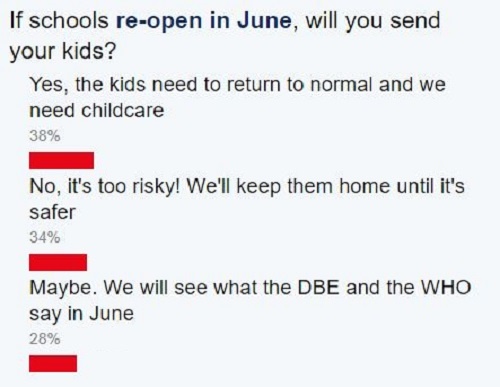During the national lockdown many parents stayed at home, some continued working from home, and juggled childcare and work each day.
But as we move through Level 4, and towards Level 3 and then 2, more and more parents are returning to work.
While this is great news for many, it is a cause of further pressure for families as most grades, and daycare centres, are no closer to opening.
Added to this stress is the fear of infection, as a Parent24 poll revealed that 34% of respondents won't send their kids to school even if they do re-open next month, while 28% are on the fence.
Even as Grades 7 and 12 start to return in June, thousands of children are still without childcare during the work day.
In response to this need, many grandparents are stepping in to assist.
Already, in South Africa, a significant portion of families involve a grandparent raising grandchildren. Reasons for this include teen pregnancy, working parents, substance abuse and incarceration.
Around 12% of households are headed by grandparents, says a 2016 report.
Another report reveals that there has been an increase in the phenomenon of grandparents as caregivers over the past 20 years in South Africa.
Only one in three South African children live with both biological parents, and 61% of those children not living with either parent reside with their grandparents, revealed the 2011 the General Household Survey.
Elderly at greater risk
Scientists are hard at work to find out more about the novel coronavirus that has taken over the planet, but research has shown that while the virus seems to have only a mild impact on children, it is potentially fatal to those with compromised immune systems, and the elderly.
We asked local doctor Carol Bosch for insight, and advice for families with little choice in the matter.
She confirmed that patients above the age of 60 are at much higher risk of developing severe symptoms of Covid-19. "Many people in this age group also have other chronic illnesses," she added, "which increases that risk."
"This can be compounded if we have families that live at home together, families with multiple generations in the same home, and perhaps those who are working in childcare."
"In this instance, where we are facing a pandemic, it is very important that we do our utmost to safeguard this high risk group," she says.
- FEEL GOOD | Ikamva Labantu gogos receive hundreds of handmade masks from local mom
- WATCH: Local teachers share hilarious clips of bungled lockdown classes
Back to school
As students slowly begin to return to school from June, Dr Bosch says that the children will most likely be expected to have a very high level of discipline when it comes to hygiene at school.
She says they'll likely be physical distancing, and be expected to wear masks, and to keep very clean with lots of hand sanitiser.
"I think it is important that all of those measures are then brought back home," Dr Bosch told Parent24, "and applied at home if you are going to be around an elderly relative or anyone with a risk factor."
How to stay safe when entering the home
Dr Bosch recommends the following steps be taken by children returning from school, or even a daily walk, each time they enter the home:
Remove shoes at the door and leave them outside, or even designate a pair of shoes as 'outside shoes' if possible.
Leave school bags at the door.
Safely remove masks, which means taking them off without touching the outside of the mask and then immediately washing hands.
Wash hands for 20 seconds before touching anyone or anything in the home.
Remove school uniform and put it in to be washed, and change into clean new clothes.
Dr Bosch recommends designating a 'hot zone' in the home, where this change over can take place, and which can be sanitised regularly.
She suggests wiping down stationary and devices like iPads that come home from school.
Vectors of infection
She says it is important to note that every part of oneself, from clothing to schoolbags, are all things that can be vectors of infection.
Dr Bosch adds that she recommends that family members limit physical affection between children and grandparents. As hard as this may be, she stresses that it is important that we protect each other.
Hygiene must be high on your priority list and everyone must be alert to this at all times, she says.
Sick children at home
If your child gets sick, whether it is with the coronavirus or another illness, make sure the grandparents or at-risk family members are not exposed to the sick child at any point at all.
"I know this is difficult and many people do not have space or cannot isolate. It is important that anyone who is sick must wear a mask at home too," she says.
Dr Bosch recommends families have a "high index of suspicion" and do everything they can to safeguard at-risk family members.
What are you doing to keep your family safe?
Share your story with Parent24. Anonymous contributions are welcome.
Email: Share your story with us via email at chatback @ parent24.com




 Publications
Publications
 Partners
Partners












